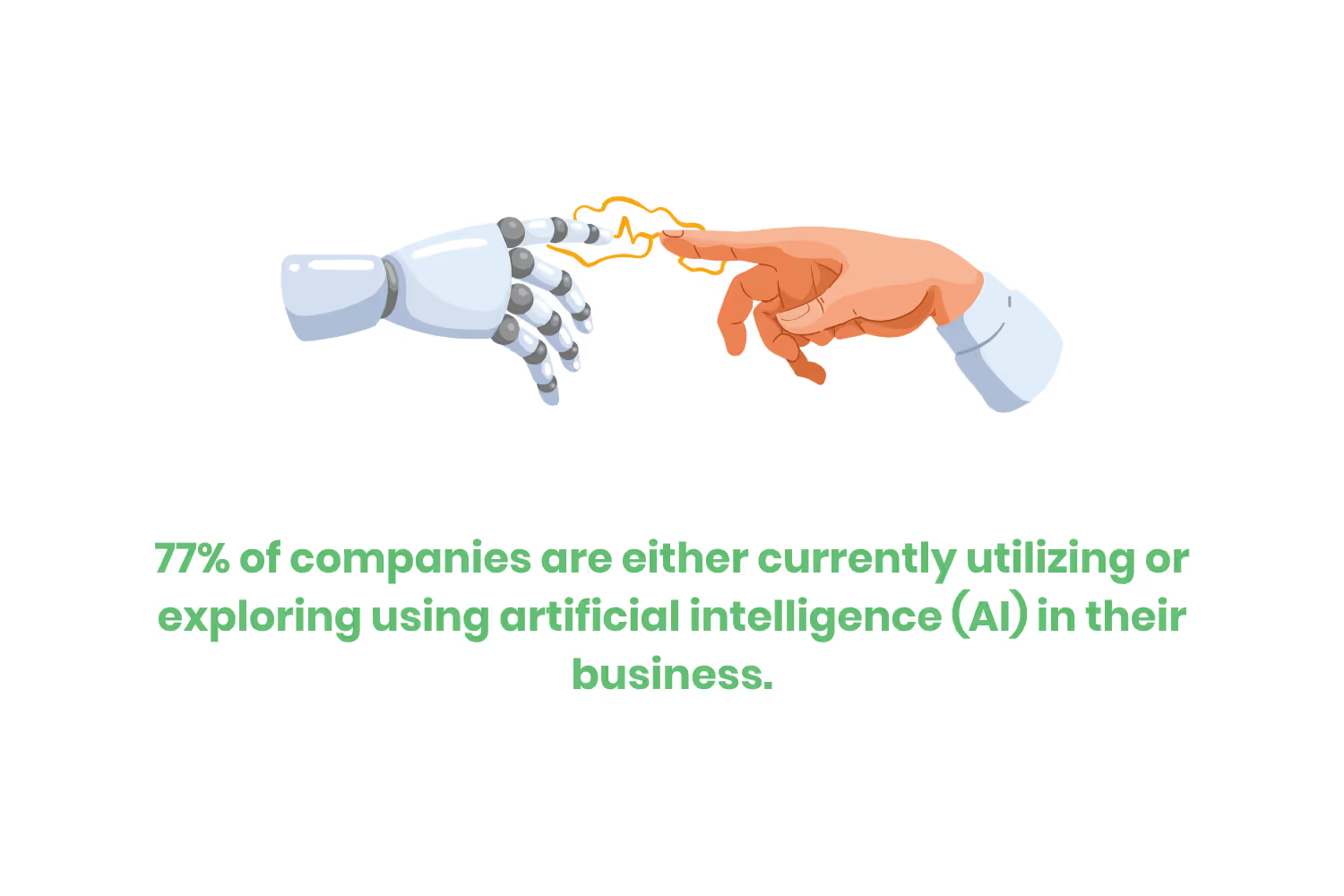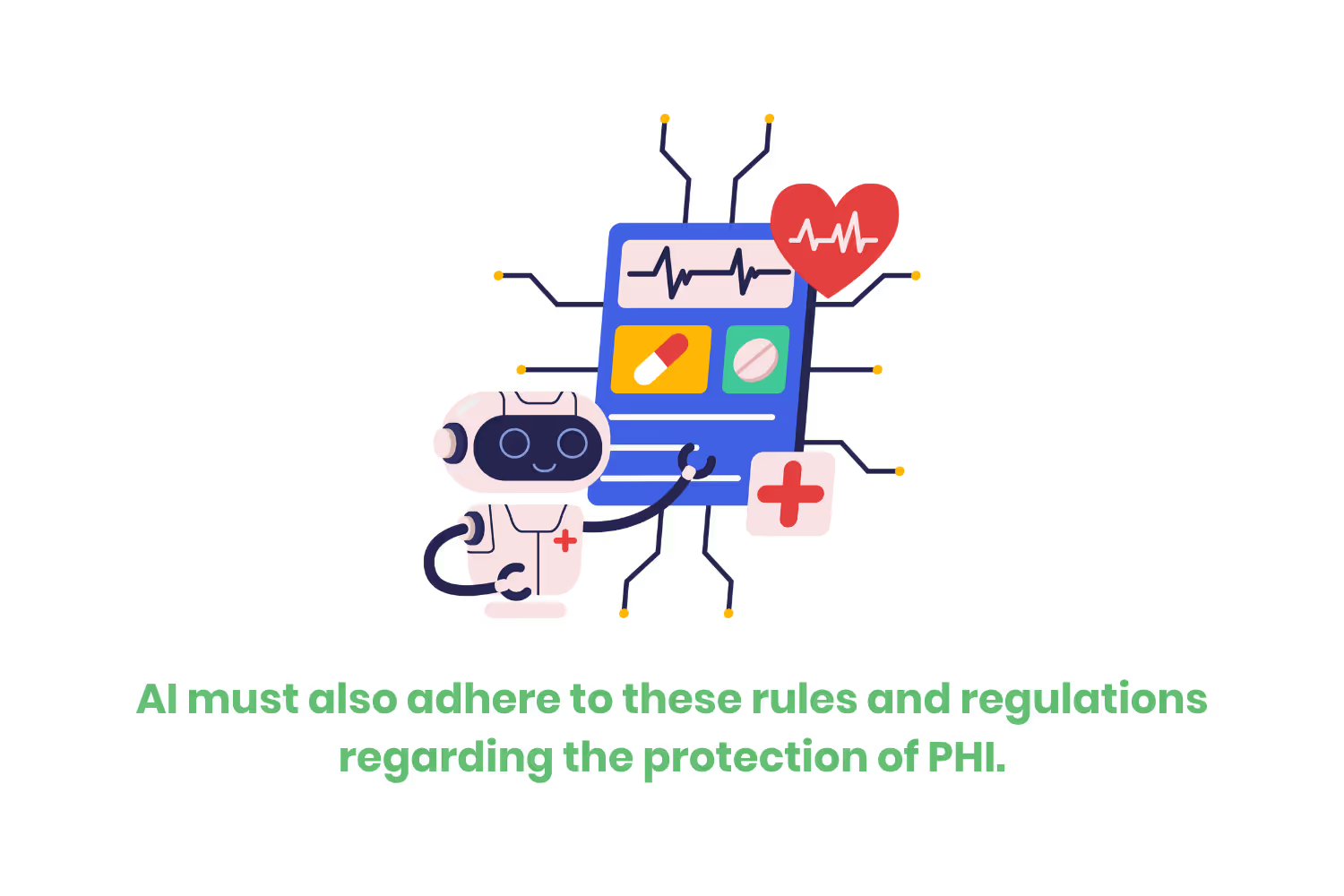[ANSWERED] Will Medical Billing and Coding be Replaced by AI?
In this blog we explore AI in medical billing and coding today, as well as what we might expect from it in the short term.

77% of companies are either currently utilizing or exploring using artificial intelligence (AI) in their business. Today, AI is on everyone’s mind. Humans found that its usefulness spans a wide range of industries. From engineering to medicine and beyond, we are now using AI in what seems like all aspects of life.
But this raises the question, “Will the use of AI replace the need for human workers?” It is a valid question and one that causes anxiety among many. One industry in particular that continuously finds new uses for AI is the healthcare industry.

A few ways AI is already used in medicine include the following:
- Disease diagnosis and prediction.
- More efficient treatment plans based on analyzing genetic data.
- Medical research during clinical trials.
- Preparing and revising manuscripts.
- Administrative tasks.
However, many medical billers and coders find themselves unsure about the “administrative tasks” part. After all, if AI takes over front desk work, doesn’t that mean fewer jobs for humans? Specifically, would the task of medical billing and coding now solely rely on technology? Today we are going to explore this topic further by talking about AI in medical billing and coding today, as well as what we might expect from it shortly. Let’s dive in!
What is Artificial Intelligence?
In 1950, Alan Turing published Computing Machinery and Intelligence. This paper prompted the question, “Can machines think?” Since then, human understanding of AI has grown exponentially. Today, we understand that AI is a set of technologies that allow computers to perform advanced functions.

These closely simulate human cognitive functions such as:
- Learning.
- Comprehension.
- Problem solving.
- Decision making.
- Creativity.
- Autonomy.
Machines and devices that utilize AI can see and identify different objects, understand and respond to languages, and much more. Through the use of computer science and data collection, these machines can engage in problem-solving and recognition of patterns. Mimicking human functioning with arguably more accuracy and faster processing.
AI in Medical Billing and Coding
Medical billing and coding are essential steps in the revenue cycle that ensure providers receive payment for services rendered. Either by insurance companies or the patients themselves. Today, AI proves valuable for bringing opportunities to the average revenue cycle management system. Especially when it comes to medical billing and coding.
There are a few types of AI when it comes to this topic that are worth mentioning:
- Machine Learning (ML) - Training software to make decisions with data like humans.
- Natural Language Processing (NLP) - This is a subdivision of ML. This allows computers to understand and respond to human language in a conversation setting.
- Computer Vision - Working with geospatial features from visual data.
Used in harmony, these processes allow AI to assist billing and coding duties with speed and accuracy. One opportunity lies in the idea of “automated coding”, which is the idea that medical coders can use technology to accurately retrieve appropriate codes without having to search through hundreds of them.

A few other ways we can apply AI in medical billing and coding are:
- Fraud Detection.
- Payment Optimization.
- Claims Processing.
- Predictive Analytics.
- Automated Claim Appeal.
- Real-time Monitoring.
- Root Cause Analysis.
- Performance Metrics.
With all of these opportunities, it’s easy to see how the implementation of AI would bring increased revenue and fewer claim denials, As well as a more streamlined claim submission process. This in turn would free up time for practice staff to focus on more pressing tasks such as patient engagement.
Humans vs. AI Expertise in Billing and Coding
Better accuracy and faster processing are two valuable qualities when it comes to managing a company’s revenue cycle. Especially when it comes to the billing and coding process. This raises the question, “If AI completely handled medical billing/coding processes, would there be no use for human billers and coders?”
Sure, AI can read data faster than humans, thus leading to faster results. However, the field of medical coding and billing has more moving parts than just the data itself. Let’s talk about a few of the reasons we won’t be seeing human billers and coders leaving the industry anytime soon.

Complex Medical Records
Medical records are hardly straightforward to maneuver. Easier with the use of technology such as electronic health records (EHRs), sure. But with a variety of different forms of note-taking that ranges from handwritten to patient intake forms and more, a lack of uniformity is an issue for AI systems. AI systems do not have the contextual awareness to navigate important information from diverse and sometimes even illegible records. This is where humans have an edge (if you’re keeping score).
Well-trained medical coders regularly navigate acronyms, abstract documentation practices, and specialty medical terminology on a day-to-day basis. They can interpret subjective information to find the best codes suited for the situation. There is a way for humans to teach AI these skills, however after humans teach it, auditors will need to check its accuracy regularly.
Healthcare Regulations
Keeping AI regularly updated with industry standards while they change and evolve is another problem. Changes in coding guidelines, payer policies, and other forms of documentation must seamlessly transcribe themselves into AI understanding. This also includes changes to a patient’s insurance coverage as well as any new state or federal legislation. The healthcare system is ever-changing and evolving in these ways and being able to translate these changes into data that AI can comprehend takes human assistance. Medical billers and coders will still need to ensure compliance with these determinations.
Security & Privacy

One of the largest complexities when it comes to using AI in medical billing, or any part of healthcare, is the concern about security and privacy. After all, training AI in healthcare requires access to large amounts of protected health information (PHI). Strict rules and regulations, such as those enforced by the Health Insurance Portability and Accountability Act (HIPAA), provide layers of security and boundaries that are not easily crossed.
AI is as much of a target for security breaches as humans. They must also adhere to these rules and regulations regarding the protection of PHI. This requires oversight from humans from a compliance standpoint.
Implementation Costs
Finally, it is wildly expensive to implement AI into any system. Medical billing and coding systems are no different. These machines need resources and special attention for development and maintenance. Both in the sense of hardware and software, as well as human labor to manage the system. Businesses should not expect to utilize this budding technology unless they have the financial means to do so, and even then, most companies will likely wait quite a while before investing.
Conclusion
There are quite a few roadblocks when it comes to the widespread implementation of AI in the medical billing and coding field. However, as I mentioned earlier, AI is making amazing progress in other aspects of healthcare. But note that there are many web-based applications used today for coding, which AI currently demonstrates the potential to support. Medical coders can expect to be able to utilize AI to help them streamline their daily tasks, but not to take over their jobs. The complexity of the roadblocks mentioned above coupled with pending advancement in AI’s ability to interpret information seems to point to AI being a tool as opposed to a replacement.
Emphasize your product's unique features or benefits to differentiate it from competitors
In nec dictum adipiscing pharetra enim etiam scelerisque dolor purus ipsum egestas cursus vulputate arcu egestas ut eu sed mollis consectetur mattis pharetra curabitur et maecenas in mattis fames consectetur ipsum quis risus mauris aliquam ornare nisl purus at ipsum nulla accumsan consectetur vestibulum suspendisse aliquam condimentum scelerisque lacinia pellentesque vestibulum condimentum turpis ligula pharetra dictum sapien facilisis sapien at sagittis et cursus congue.
- Pharetra curabitur et maecenas in mattis fames consectetur ipsum quis risus.
- Justo urna nisi auctor consequat consectetur dolor lectus blandit.
- Eget egestas volutpat lacinia vestibulum vitae mattis hendrerit.
- Ornare elit odio tellus orci bibendum dictum id sem congue enim amet diam.
Incorporate statistics or specific numbers to highlight the effectiveness or popularity of your offering
Convallis pellentesque ullamcorper sapien sed tristique fermentum proin amet quam tincidunt feugiat vitae neque quisque odio ut pellentesque ac mauris eget lectus. Pretium arcu turpis lacus sapien sit at eu sapien duis magna nunc nibh nam non ut nibh ultrices ultrices elementum egestas enim nisl sed cursus pellentesque sit dignissim enim euismod sit et convallis sed pelis viverra quam at nisl sit pharetra enim nisl nec vestibulum posuere in volutpat sed blandit neque risus.

Use time-sensitive language to encourage immediate action, such as "Limited Time Offer
Feugiat vitae neque quisque odio ut pellentesque ac mauris eget lectus. Pretium arcu turpis lacus sapien sit at eu sapien duis magna nunc nibh nam non ut nibh ultrices ultrices elementum egestas enim nisl sed cursus pellentesque sit dignissim enim euismod sit et convallis sed pelis viverra quam at nisl sit pharetra enim nisl nec vestibulum posuere in volutpat sed blandit neque risus.
- Pharetra curabitur et maecenas in mattis fames consectetur ipsum quis risus.
- Justo urna nisi auctor consequat consectetur dolor lectus blandit.
- Eget egestas volutpat lacinia vestibulum vitae mattis hendrerit.
- Ornare elit odio tellus orci bibendum dictum id sem congue enim amet diam.
Address customer pain points directly by showing how your product solves their problems
Feugiat vitae neque quisque odio ut pellentesque ac mauris eget lectus. Pretium arcu turpis lacus sapien sit at eu sapien duis magna nunc nibh nam non ut nibh ultrices ultrices elementum egestas enim nisl sed cursus pellentesque sit dignissim enim euismod sit et convallis sed pelis viverra quam at nisl sit pharetra enim nisl nec vestibulum posuere in volutpat sed blandit neque risus.
Vel etiam vel amet aenean eget in habitasse nunc duis tellus sem turpis risus aliquam ac volutpat tellus eu faucibus ullamcorper.
Tailor titles to your ideal customer segment using phrases like "Designed for Busy Professionals
Sed pretium id nibh id sit felis vitae volutpat volutpat adipiscing at sodales neque lectus mi phasellus commodo at elit suspendisse ornare faucibus lectus purus viverra in nec aliquet commodo et sed sed nisi tempor mi pellentesque arcu viverra pretium duis enim vulputate dignissim etiam ultrices vitae neque urna proin nibh diam turpis augue lacus.



![[ANSWERED] What is a Long-Term Care (LTC) Pharmacy](https://cdn.prod.website-files.com/67e2b8210878abcba6f91ae6/68d687806a075a1cf64659b0_WhatisLongTermCarePharmacy_925.avif)
